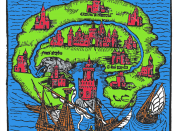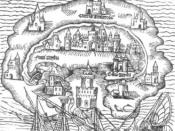Thomas More's context was 16th century England, which entailed the Humanist movement. Thomas More constantly shifted between the ideals of Humanist philosophy and service to his king and country. The period leading up to the writing of Utopia swelled a massive personal dilemma within More between philosophical idealism and worldly pragmatism. It can be witnessed in More's novel Utopia, that Book Two is a clear expression of Thomas More's own context. Several issues that he addresses in Book One are pertinent to our understanding of his reasoning in Book Two. Issues such as the money & property, slavery and education are attacked by More in Book One and in Book Two; he provides a solution to these issues. More's ingenuous use of language techniques also heightens the realism of his expressions
An important issue that More attacks is the operation of the economy. More's context maintained a system of feudalism which culminated in the majority of people supporting a minority of undeserving, idle, bourgeois noblemen.
However, in Book Two of Utopia he addresses this inequity by proposing the absence of currency. As Raphael says in Book Two
"There's more than enough of everything to go around , so there's no risk of asking for more than he needs - for why anyone want to start hoarding, when he knows he'll never have to go short of anything?"
We can see here that the use of colloquial language and rhetoric is key in emphasising the importance of this issue. Raphael indicates that the non-existence of money means that there is no exploitation, greed or power. In fact, it forces people to treat one another on an egalitarian basis. The keystone of the Utopia lies in the policy of communal property. Everyone shared, worked and had equal rights on the same...



"The Utopia" of Book Two is a clear expression of More's reaction to his own context. Explain with specific examples from the book.
Anish Mutchalla didn't write a good essay.
0 out of 0 people found this comment useful.